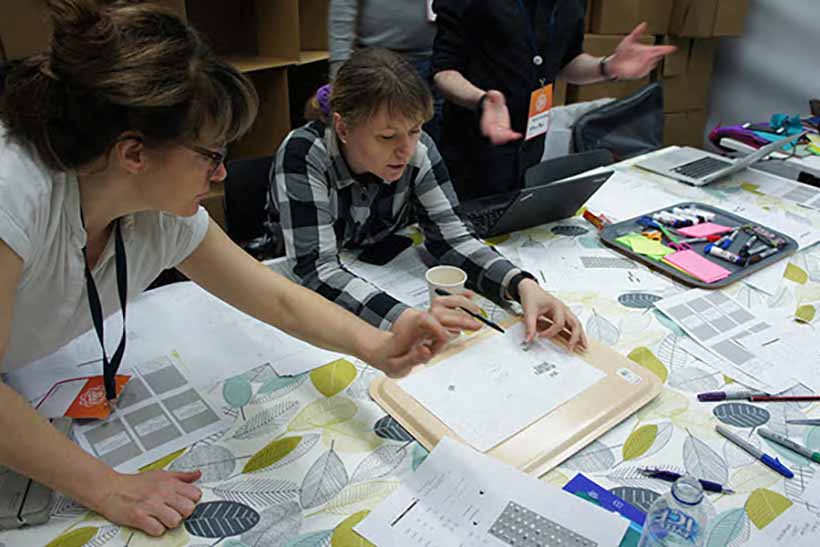Workshops are a powerful way of extracting important insights into the problems, concerns and needs of clients or their users. Here at Cyber-Duck, we have extensive experience running workshops with a wide range of clients including the Bank of England, University of London and Institute of the Motor Industry. Here I’ll share some tips on how to get the most out of workshops, from effective structuring to dealing with unexpected questions.
Workshops are an interactive, fun and efficient way to gather information from stakeholders. They can come in multiple formats that vary in terms of length, setting, and numbers and types of people. They can also be used for a number of different purposes such as brainstorming ideas for a marketing strategy, defining the essence of a new brand or identifying the structure of a new website.
Leading a workshop is not trivial, you are tasked with making sure it runs smoothly from beginning to end. Energy levels need to be maintained and equal participation from everyone there should be encouraged. Here I’ll share 5 quick tips that might help you run your own effective workshop.
1. "I Can't Do This"
In every type of exercise or activity you present, you might find a participant who doesn’t believe they can do it. It could be a sketching exercise and the participant might argue that they can’t draw, or it could be a brainstorming exercise that asks them to come up with a new strapline.
As a facilitator, you need to show them that they can do it indeed, the aim of the workshop is not to necessarily judge their outcome, but to work cooperatively. Using the sketching example above, try rephrasing the task to highlight how sketchy or how rough the outcome should be. Another option is to break down the activity into smaller tasks, get participants to reach the final outcome step by step. For example, if you are asking them to design the homepage, why not starting with some elements of it? Also, don’t underestimate the power of icebreaking activities. Put your participants at ease at the very beginning and you will get many more insights from them.
2. "Yawn"
As a good facilitator, you need to always pay attention to the energy level of the group. When planning a workshop, allow extra time for breaks in between and be flexible about when to schedule them. As soon as you perceive a fall in energy, suggest a quick break (10 minutes will be enough). Also, try to plan energetic activities after lunch, when people are likely to feel sleepy. Tasks that require participants to move around and stand up will help to get them back into the flow.
3. "Are We Doing Your Job?"
A client may be uncooperative in participating in the workshop if they don’t see the value in doing so. To avoid this, the aims and purpose of the workshop need to be clearly defined at the start of the session. Explain to them that they are experts in their industry. Through them sharing their knowledge it ensures that no vital information is missed, and no time is wasted before moving straight on to the creative work. The outcome of the workshop needs to be emphasised as just a basis from which the production can start. These are by no means the final deliverables.

Running a workshop allows us to work collaboratively with you from the outset
4. "What Do You Think?"
Very often it happens that one of the participants will ask for the facilitator’s opinion on something. “Do you agree?” “Is this right?”. Most of the time the best thing to do is not to answer those questions. A good facilitator is one that makes themselves invisible and puts the others at the centre of discussion. If this happens, try to twist the situation around by simply asking back “What do you think?”. This doesn’t mean that you never give your contribution to the discussion, but try not to influence your participants. Provide examples of similar projects, or facilitate the discussion asking questions that might help participants analyse the options or make a decision.
5. "5 More Minutes"
Before starting a workshop, identify the minimum outcome you want to take away. Leave one or more of the tasks that are not fundamental until the end of your session.Therefore if the initial tasks run longer than planned, you can skip the last activities without compromising the main goal of the workshop.
Remember also that sometimes the spontaneous discussions can actually give greater insights than planned activities. So do allow some time for this. However, if you are working with a group that tends to expand excessively, you need to be stricter with each activity.
Use a timer if you like (your phone will be fine) and don't be afraid to stop people when the timer goes off. They will appreciate that you are trying to give them the most help you can out of the workshop.
Summary
Running workshops is a fantastic opportunity to be creative. Use these tips to plan activities that will guarantee you collect data that will improve the creative process. Remember that when planning a workshop it is important to be flexible and reactive, in order to adapt to whatever your audience needs.
If you want to learn more about workshops and UCD process here at Cyber-Duck, get in touch.

